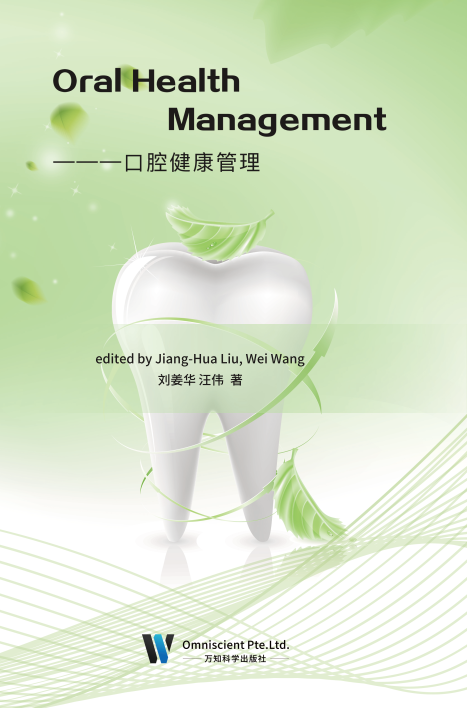
Preface
The World Health Organization (WHO) interprets the new concept of health for the world, and has established a standard for measuring the quality of life and human health, and oral health is listed here. Oral health is one of the important signs of human modern civilization. In the society with reform and opening up policy, communications and contacts among people have become more frequent. As a part of people’s appearance, teeth have their own unique charm. White teeth, fresh breath and brilliant smiles have objectively become one of the important factors affecting people’s choices of careers, spouse and job.
Modern medical research has proved that oral diseases may cause chronic enteritis, intestinal tuberculosis and other gastrointestinal and digestive diseases, as well as many systemic diseases such as diabetes, canker, headache, sepsis, arthritis, rheumatic heart disease, myocarditis, endocarditis, bronchitis, pharyngitis, tonsillitis, pneumonia, chronic nephritis, Alzheimer's disease and cancer.
It should be especially reminded that the oral disease status of white-collar workers aged 26 to 35 is significantly higher than that of white-collar workers in other age groups. Besides, oral cancer, the deadly killer of oral diseases, is also showing a younger trend year by year. Oral diseases can cause toothache, decreased chewing function, poor development, affect facial appearance, and affect people's social communication and psychological behavior. And what's worse, the germs of oral diseases can also cause systemic diseases and become the chief offender for many system diseases, seriously affecting the quality of human life.
Life needs conservation. Since oral health is related to the quality of life, the conservation of life must start with oral health. In this sense, it can be said that investing in oral health is to appreciate and respect life.
前 言
世界卫生组织(WHO)为全球诠释了健康新概念,并树立了衡量生命质量及人体健康的标准,口腔健康被列入其中。口腔健康,是人类现代文明的重要标志之一。在改革开放的社会里,人们之间的交流和接触更趋频繁,作为人的外表形象的一部分,牙齿有着其独特的魅力,洁白的牙齿、清新的口气和灿烂的笑容,客观上已成为人们职业选择、配偶选择和工作选择的重要影响因素之一。
现代医学研究证明, 口腔疾病可引起慢性肠炎、 肠结核炎等胃肠消化系统疾病,以及糖尿病、溃疡病、头痛、败血症、关节炎、风湿性心脏病、心肌炎、心内膜炎、支气管炎、咽喉炎、扁桃体炎、肺炎、慢性肾炎、老年痴呆症和癌症等全身疾病。尤须提醒的是,年龄在 26~35 岁的白领口腔疾病状况,明显高于其他年龄段的白领群体。不仅如此,口腔疾病中的致命杀手口腔癌,也逐年呈年轻化趋势。口腔疾病
不仅引起牙疼、咀嚼功能下降、发育不良、影响面部美观、对人的社会交流和心理行为产生影响,更可怕的是,口腔疾病的病菌还会引发全身性系统疾病,成为许多系统疾病的罪魁祸首,严重影响人的生命质量。
生命需要养护,因为口腔健康关乎生命质量,所以,养护生命必须从口腔保健做起。从这个意义上可以说,重视口腔健康的投资,就是对生命的敬畏与尊重。

Jiang-Hua Liu, female, the Han nationality, born in Hegang City, Heilongjiang Province in May 1976, graduated from Capital Medical University with a bachelor’s degree. She is the current deputy dean of Beijing Yonglin Stomatology Hospital. Through the effective combination of traditional Chinese medicine concepts of health preservation, psychological healing, and comfortable diagnosis and treatment, she has established a set of oral health management concepts and executable standard processes. She Obtained 14 national patents and in 2017, she got the National Secondary Psychological Consultant certificate.
刘姜华,女,汉族, 1976 年 5 月生,黑龙江鹤岗人。毕业于首都医科大学,本科学历。现任北京永林口腔医院副院长,多年来把中医的养生理念、心理疗愈和舒适化诊疗多维度的有效结合建立了一套口腔健康管理的理念和可执行的标准化流程。获得国家级专利 14 项, 2017 年取得国家二级心理咨询师资格。

Wei Wang, male, the Han nationality, born in Beijing in April 1975, bachelor’s degree. He has been engaged in high-performance computing for a long time, familiar with statistics, genetic analysis, image processing, mathematical modeling and other computing tools. He conducted in-depth and extensive research on artificial intelligence and computer networks, and has published more than ten scientific papers in core journals.
汪伟,男,汉族, 1975 年 4 月生,北京人,本科学历,长期从事高性能计算工作,熟悉统计学,基因分析,图像处理,数学建模等计算工具,对人工智能与计算机网络亦有深入研究与广泛涉猎,核心期刊发表科技论文十余篇。